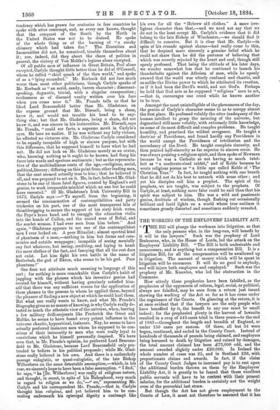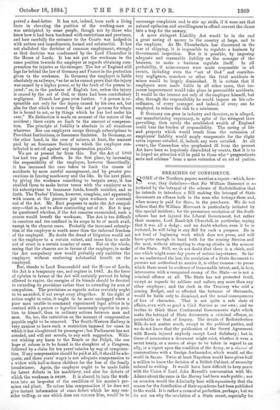THE WORKING OF THE EMPLOYERS' LIABILITY ACT. r "E Bill
will plunge the workman into litigation, so that the only persons who, in the long-run, will benefit by it will be the lawyers." Such was the prophecy of Lord Brabourne, who, in the House of Lords, led the attack on the Employers' Liability Bill. "The Bill is both undesirable and unnecessary, and is anything but a compensation Bill. It is a litigation Bill, for all the compensation will be swallowed up in litigation. The amount of money which will be spent in litigation will be enormous. It will do no good to anybody, and will injure both employers and employed." Such was the prophecy of Mr. Knowles, who led the obstruction in the Commons.
How utterly these prophecies have been falsified, as the prophecies of the opponents of reform, legal, social, or political, always are falsified, may be seen from a return just issued showing the working of the Act so far as it has come under the cognisance of the Courts. On glancing at the return, it is at once evident that if the lawyers are the only people who have benefited by it, the benefit to any one must be small indeed ; for the prophesied plenty in the harvest of lawsuits resulted in a crop of 443 cases tried in three years—to the end of 1883—throughout the length and breadth of England, or under 150 cases per annum. Of these, all but 34 were begun, continued, and ended in the County Court. Instead of hundreds of thousands of pounds being claimed, and employers being harassed to death by litigation and ruined by damages, the total amount claimed has been £73,000 odd, and the amount awarded slightly under £20,000. In Ireland the whole number of cases was 25, and in Scotland 236, with proportionate claims and awards. In fact, if the claim of the County Court Judges to increased pay is to rest upon the additional burden thrown on them by the Employers' Liability Act, it is greatly to be feared that those excellent public servants will have to be content with their present salaries, for the additional burden is certainly not the weight even of the proverbial last straw.
But though the Act has not given employment to the Courts of Law, it must not therefore be assumed that it has
proved a dead-letter. It has not, indeed, been such a living force in elevating the position of the working-man as was anticipated by some people, though not by those who knew how it had been burdened with restrictions and provisoes, and how carefully the entrance to the Courts was hedged-in with notices and impediments, formal and substantial. It has not abolished the doctrine of common employment, strongly as that doctrine was condemned by the Lord Chancellor in the House of Lords. It has not put the workman in the same position towards the employer as regards obtaining com- pensation for injuries as the stranger. The law of England still lags far behind the law of Germany and France in the protection given to the workman. In Germany the employer is liable absolutely on railways," so far as he cannot prove that the injury was caused by a higher power, or by the fault of the person in- jured ;" or, in the parlance of English law, unless the injury is caused by the act of God, or there had been contributory negligence. French law goes even further. "A person is re- sponsible not only for the injury caused by his own act, but also for that which is caused by the act of persons for whom he is bound to act, or by things which he has had under his care." No distinction is made on account of the nature of the accident ; there exists no limit to the amount of compensa- tion. The principle of liability is absolute in all situations whatever. Nor can employers escape through subscriptions to Provident Institutions, or Insurance Societies. In Germany, on the other hand, in the case of miners, at least, the amount paid by an Insurance Society to which the employer con- tributed is set-off against any compensation payable.
We are at present far from this. But the Act of 1880 has had two good effects. In the first place, by increasing the responsibility of the employer, however theoretically, it has increased the care taken to limit the causes of accidents by more careful management, and by greater pre- cautions in fencing machinery and the like. In the next place, by giving the workmen something to bargain away, it has enabled them to make better terms with the employer as to his subscriptions to insurance funds, benefit societies, and so forth. The Trades' Unions, however, complain, and apparently with reason, at the pressure put upon workmen to contract out of the Act. Mr. Burt proposes to make the Act compul- sory—that is, not to allow contracting out of it. But it may be questioned whether, if the Act remains unamended, such a course would benefit the workman. The Act is too difficult to construe and too confined in its scope to be of much avail, except in the clearest cases. Probably the increased subscrip- tion of the employer is worth more than the enforced freedom
- of the employed. No doubt the dread of litigation would act on the employer to a certain extent, and cause him to settle out of court in a certain number of cases. But on the whole, seeing that the chances are in favour of the employer, to make the Act compulsory now would probably only embitter the employer, without conferring substantial benefit on the employed.
But, thanks to Lord Beaconsfield and the House of Lords, the Act is a temporary one, and expires in 1887. As the force of cpinion in favour of the Ad will certainly prevent its being allowed to expire, the energies of its friends should be devoted to extending its provisions rather than to extending its area of compulsion. The provisions as regards notice certainly ought to be amended, if not swept away altogether. lithe right of action ought to exist, it ought to be more unclogged when a poor man unable to command experienced legal advice is to
contend with a person ex hypothesi immensely superior in posi- tion to himself, than in ordinary actions between man and
man. So, too, the restriction on the amount of compensation payable ought to be removed. The South-Western Railway is very anxious to have such a restriction imposed for cases in which it has slaughtered its passengers ; but Parliament has not acceded, and will not accede, to any such suggestion. With- out wishing any harm to the Bench or the Pulpit, the one hope of reform is to be found in the slaughter of a Congress, followed by a claim for ten years' salaries by way of compensa- tion. If any compensation should be paid at all, it should be ade- quate, and three years' wages is not adequate compensation to a widow with half-a-dozen children for the loss of the family breadwinner. Again, the employer ought to be made liable for latent defects in his machinery, and also for defects of
which the workman is aware. It is absurd to turn the work- man into an inspector of the condition of his master's pre-
mises and plant. To refuse him compensation if he does not give instant information of some defect which he may con- sider trifling, or one which does not concern him, would be to encourage complaints and to stir up strife, if it were not that natural optimism and unwillingness to offend convert the clause into a trap for the unwary.
A more stringent Liability Act would be in the end a great saving of money to the country at large, and to the employer. As Mr. Chamberlain has discovered in the case of shipping, it is impossible to regulate a business by Government inspection. But it is possible, by imposing adequate and reasonable liability on the manager of the business, to make a business regulate itself. In all probability, if mine-owners were made responsible in all events, including even the "act of God" and contribu- tory negligence, somehow or other the fatal accidents in mines would be largely diminished. It is certain that if employers were made liable in all other cases, that im- mense improvement would take place in preventible accidents. It would be the interest not only of the employer himself, but also, through the responsibility he would impose on his sub- ordinates, of every manager, and indeed, of every one he employed, to reduce the risk to a minimum.
If Germany can grow in industry and threaten, as is alleged, our manufacturing supremacy, in spite of the stringent laws prevailing, then surely the established wealth of England could tear the burden of responsibility. The saving of life and property which would result from the extension of employers' liability would amply compensate for the slight extra expense entailed, if, indeed, any were entailed. At all events, the Cassandras who prophesied ill from the present Act have been so hopelessly discredited by events, that it is to be hoped no attention will be paid to those who " prognosticate sects and schisms" from a mere extension of an act of justice.



































 Previous page
Previous page